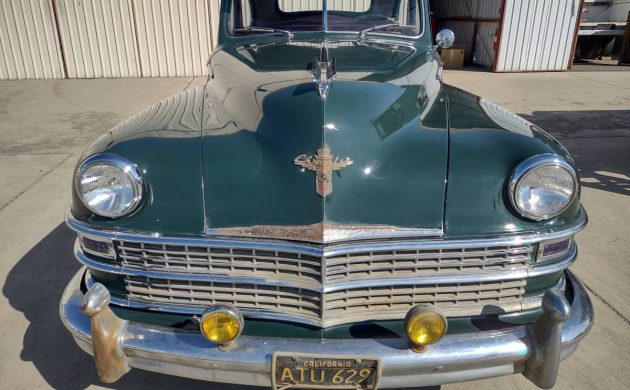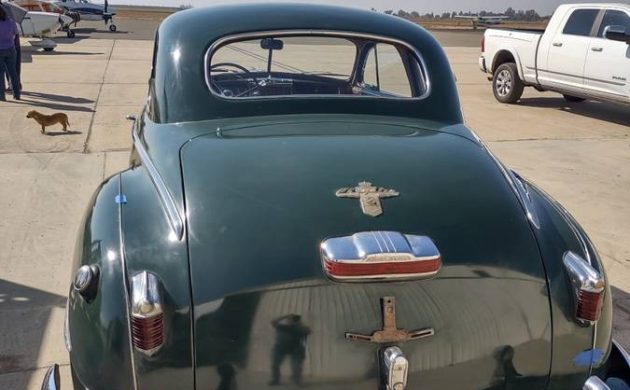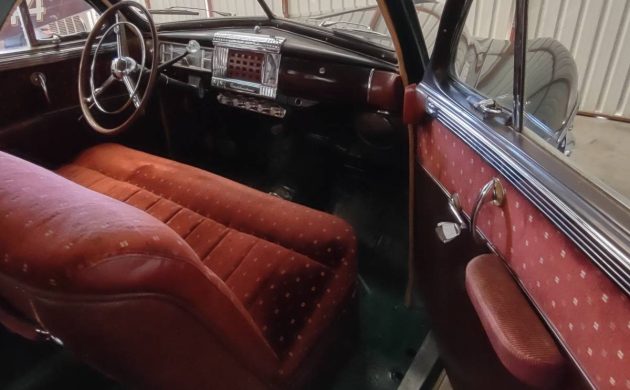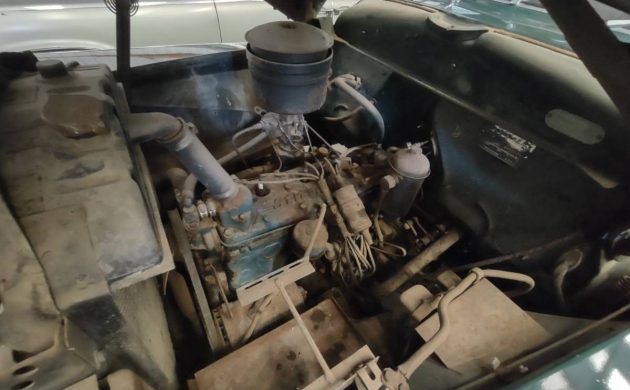Stored Since Cold War: 1947 Chrysler Windsor Coupe
Chrysler products built from 1946 through 1948 are never going to win any beauty contests with the possible exception of the Town and Country wood bodied models. However, if there were an award for the best value in the collector car market today, they would win hands down. Why? They are built like tanks, can haul around a football team, and they just flat-run forever. A perfect example would be this 1947 Chrysler Windsor coupe for sale on Craigslist in Madera, California. Coming out of storage since 1992, this big Chrysler is priced at $7,500. Is that too much for a fairly solid car that isn’t running at the moment? If so, what would a fair offer be? Thanks to T.J. for yet another great tip!
One could make the argument that Chrysler’s experience with the Airflow in the thirties made the company rather gun-shy about taking styling risks for decades to come. They stepped a little out of that car’s shadow with their Hayes-bodied coupes in 1939 and with the Newport and Thunderbolt show cars. K.T. Keller, who was president and later chairman of Chrysler, gets most of the blame for this styling malaise. With the benefit of hindsight, you can see why this was a sound decision. Chrysler was doing well in the sales department and the company had built a reputation for producing cars that were both reliable and technologically advanced for the time. The postwar market turned out to be a little different though.
After the strain and stress of the Depression and the subsequent war, customers were looking for a little excitement. The problem was that Detroit resumed production of the models that they were punching out before the war almost without exception. In some cases, the designs were warmed over, but the cars were the same for the most part. Upstarts Kaiser-Frazer, Tucker, and Crosley were the only notable makers to start with a fresh sheet of paper. In a seller’s market, warmed-over prewar designs sold well until that pent-up demand was satisfied.
Chrysler’s offerings across the board provided solid transportation at reasonable prices. They also were roomy cars powered by proven powerplants. The problem was that the styling contributed to the impression that they were huge. Chrysler still offered a straight eight-cylinder engine in the New Yorker line until 1950, so a larger-than-life front end was somewhat necessary. The car you see here belonged to the Windsor line. While less expensive than the New Yorker and lacking the eight-cylinder engine, the Windsor used the same bodies and rode on the same chassis. The big difference was a still very adequate version of Chrysler’s venerable 25″ inline six-cylinder engine managed the motivation duties. The lower-cost Windsor made up more than 60% of production.
This particular Windsor is a 1947 model that has been stored since 1992. When it entered storage, it was a running and driving car. Since emerging from its slumber, the car has been gifted a set of tires and a battery. It is not currently running though. While there is no information as to how fouled the fuel system and gas tank might be, parts are available, and working on these engines is not particularly complicated. The engine is said to turn over. It is also a standard three-speed car according to the ad. There is no mention of the interesting Presto-Matic semi-automatic system being installed.
The only drawbacks besides dust and the car’s current non-operable status are some crazing in the paint and some minor imperfections here and there. Chances are it is an unrestored car. With the proper amount of elbow grease, cleaning supplies, and mechanical aptitude, this car would likely be capable of driving anywhere once brought back to life. While they were big and slightly homely in appearance, you just cannot find a more reliable classic vehicle for the price. The reputation these cars had for running forever is both real and deserved. Hopefully, it finds a good home with someone who enjoys driving it.
Do you think that 1946-1948 Chrysler products are hidden gems for collectors who want a great car to drive and enjoy? Why or why not? Please share your thoughts in the comments.
Auctions Ending Soon
 2006 Ford Mustang Saleen S281 SCBid Now4 hours$16,000
2006 Ford Mustang Saleen S281 SCBid Now4 hours$16,000
 2002 Subaru Impreza WRXBid Now3 days$333
2002 Subaru Impreza WRXBid Now3 days$333
 1975 Chevrolet Corvette ConvertibleBid Now3 days$3,000
1975 Chevrolet Corvette ConvertibleBid Now3 days$3,000
 1964 Ford F-100 Camper CustomBid Now3 days$2,000
1964 Ford F-100 Camper CustomBid Now3 days$2,000
 2006 Jeep Wrangler SportBid Now5 days$10,500
2006 Jeep Wrangler SportBid Now5 days$10,500






Comments
I love the 48 Plymouhs and Dodges. Yeah, the Chryslers are a little long in the nose.
I’m with you on this Rex. Seems like the higher up the line the less “fashionable” (sounds better than almost ugly) they were. The Plymouth was the closest to being a jewel and still looks good with a youthful tinge compared to all other Chrysler products of the era. I especially liked the 42 four door from the other day, could live with and enjoy that one.
I like. They kind of have that “Keep on Truckin” stance going on.
My mother traded-in her 1942 Nash on a 1948 Plymouth — and both cars ran very well. All that the Nash needed, was a muffler, but she decided to get a new car instead. The ’48 Plymouth took many long trips and did not protest. But the speedometer was a problem, after an accident on the Worcester Turnpike in January of 1949. There was sudden sheet ice, with a multiple car pile-up up ahead. The brand-new 1949 Plymouth in front of us managed to stop, and so did we. But within moments we were slammed from behind, severely bashing-in the rear of our car, which also drove the nose of our car into the rear bumper of the ’49, caving-in the grille and causing the radiator to rupture. The ’49 had only bent rear bumper-guards and the bumper a bit out-of-line. We were stuck — disabled right there. The man in the ’49 drove us to a hotel (or, motel, not sure which, after nearly 75 years), so we had a place to stay. The ’48 Plymouth got repaired — but, ever after that, the speedometer would make a “juh-juh-juh-juh” sound, and give erratic readings. We had the speedometer cable replaced, and that ended the problem… for a short time, until it came back: repeated replacements of that pesky speedometer-cable proved only temporary, as the new cable would soon kink as the old one had. The repair of that car from the accident involved straightening the frame — and I always figured that they never got that quite right. My mother traded it in, and my father traded his ’39 Packard in, both on a 1951 Packard. What I noticed right away about the Packard was, far more pep in climbing steep hills. We all remember, in “Driving Miss Daisy”, that she wrecked a Chrysler of this 1946-’48 vintage at the start of the movie. But the incongruities of that film always amused me. Why was Booley’s Cadillac Sedanette not a ’48 instead of a 1949? And when he with Hoke went to pick up Daisy’s new 1955 Cadillac, why the fifty-star flag in the showroom and a 1956 car parked outside? Then, when Hoke and Daisy drove to Alabama, why did the black Cadillac keep switching back-and-forth, between a 1955 and a 1956? (the ’56 having bad rear shocks) — Enquiring minds want to KNOW these things!
I just can’t imagine living in a time when this was considered a practical car to buy. If you showed up at work one day in 1948 with this your coworkers would tell what a sensible purchase you made. I love it and this one looks like a dandy. The flathead shouldn’t be too hard to get running again, check out the brakes and other safety stuff and have fun. Now if you show up at work in a new sensible car its most likely a Kia or some other chunk of plastic that cost more than us old guys paid for our 1st houses.
I agree, geezer, this was a car for the working,,um,,,man, sorry ladies, the only way women drove these is if the husband died. I doubt a family man, more like the single uncle that lived at home with a good factory job,,type. Today, a new car gets little, if any attention. Another silver Kia, big deal, but back then, we were still riding high on our victory overseas. Many GIs stayed in the military after the war and while laying in the trenches of France, ( or so it was told) dreamed of a new Chrysler when they got back. This was the car they bought, and it served them well. They were good road cars too and made many trips back “to the farm”. I can see it now, ma hollering to pa, who is peering out from under the pre-war Fords hood, “looky pa, junior is home and driving a new Chrysler”.
If I had to choose between a Kia or a ‘47 Chrysler coupe to show up in at work I definitely would fall into the ‘47 category. It wouldn’t matter if I was the owner or passenger, the coupe has persona as big as its self. Say what you want about the styling, it is beautiful to me. The interior upholstery and seating looks like the furniture in the lobby of a ritzy hotel. Kia’s aren’t bad cars. I just can’t describe one as being old school classy or even grand in its styling. Does anybody even use words like grand anymore except maybe grandparents.
I do too Rex. Had a ’46 Plymouth P-15 4-door and loved it. My grandma
had a ’48 Imperial limousine that she
used to deliver cakes and pastries to
all the stores she had contracts with
as she ran a small bakery from her home after grandpa died in 1933. And when she wasn’t doing deliveries,
she would take the grandkids for rides in it on some occasions. I still
recall those overstuffed seats that
swallow a young boy whole. And while I like this car, I’d be leary of buying it as the new owner would be
held liable for all back titling fees since the car went into storage. And in a state like California, that could run as high as 10K or more depending
on what items Gavin Newsom and the
rest of those snowflakes out there.
And now I see where they’re coming
for your old cars too! So that makes
me wanna sit this one out. Still a nice
car though.
“Stored since the Cold War”? I hope it’s been driven during that time, or at least the engine is started during all that time.
Beauty is in the eye of the beholder and to my eye the Mopar vehicles of the late forties are very appealing. Unfortunately I’m almost as old as this car and not up to the task of getting it roadworthy again. Nevertheless, this will be a straightforward project. New fuel system, tune up and possible brake work and I bet you’ll be good to go. GLWTS.
Love this car, great styling especially the grille! Eye of the beholder and all that. Had a ’46 Plymouth Special Deluxe coupe as my first car. Easy to work and learn on…fond memories.
I’d take this car in a second if I didn’t have too much money wrapped up in my horses. Maybe I need to reassess my priorities…
Nice car – fix it up stock or put a 383 and a 727 trans plus a 83/4 rear end in it, keep the outside relatively stock looking except for tires and duel pipes, thats the way i’de like it.
Of course upgrade brakes in addition to the V8. The price is now $5,950 on craigslist.
Where is car located?
I also have no problem with 1942-’48 Mopar styling — but then again, I am quite a bit OLDer than these cars. They were the most graceful of the left-over pre-war bodies that were “warmed-over” for 1946 — until the high demand ran drier and buyers wanted a change. Unfortunately, the change Chrysler brought to its stable of vehicles in 1949, looked dowdy and dated from day-one: they were designed by engineers for practicality and longevity and headroom, not for style. Those Dodge and Chrysler tail-lamps in ’49, were shades of 1941. And the facelifts of 1950 made these cars even worse — stubby! Happily, they received badly needed new noses in 1951, and much improved rears in 1953, making them downright beautiful — especially so with the Chrysler (what has HAPPENED to all the lovely ’53 Chryslers, by the way?). 1954 simply added unneeded chrome “blooming” on features which looked far nicer on the ’53 models. Starting in 1955, insanity took hold, and things began to get hideously excessive and downright weird (the ’55 Dodge was nice — until they ruined it in the ’56 facelift). As you might guess, I utterly HATED the mid-to-late 1950s “fins”, in most cases — especially so with Mopar. But then again, they went straight for goofy and ugly in the 1960-1962 cars (the ’62 Imperial being a beautiful exception). I could not see ANYONE wanting to appesr in a 1961 DeSoto! (Just me) 1961 also was the year that Nash destroyed the look of their Rambler!
Neighbor has a 4 door, with a Camaro front suspension, disc brakes, SBC, 4 speed hydramatic, stock from firewall back, all sheet metal and interior are original, pulls big Airstream with it, and is not afraid to use it. It is a classy car to look at, and a modern car to drive. And, yes, seat belts, and a dual chamber master cylinder, and bias-look radial tires.
2 years ago i found a 48 Desoto on Craigs list for 3 grand about 30 minutes from home, went and looked at it complete car needed a battery, asked the man what his best price was he said 2500, i paid him and called the roll back to come get, i put another 1500 in it, new tires and brakes, plus a few little goodies, i get more people looking and asking questions than alot of big money cars at shows and cruises love the fluid drive
I don’t like coupes, so, this wouldn’t be my ride. But it did not escape my notice at the time, that 1950-1954 Plymouth, Dodge, DeSoto, and Chrysler (except for that beautiful 1953!) automobiles were common sights still on the road 30 years later. You saw 1953 Fords and Mercurys and 1950-1954 Chevys. Certain other cars of this time (e.g., 1954 Buicks) seemed to be long-gone by the early 1980s. But you couldn’t kill those Mopars! And unlike more stylish vehicles, Mopars had plenty of headroom, easy entrance and exit, uber-generous visibility out through the windshield, and comfort galore. They retained interior earthtones long after others had gone to blues and greys. Does anyone else remember those mid-‘fifties driver’s seats that turned, giving easy entrance and exit for “senior” drivers? What ever became of that inspired idea?